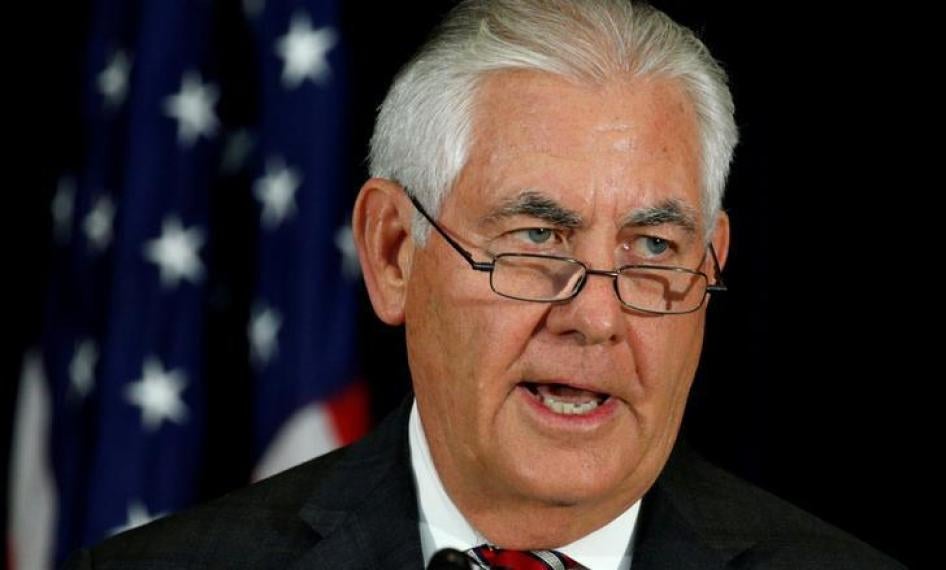US Secretary of State Rex Tillerson is travelling to Thailand next week and will be meeting with Prime Minister Gen Prayut Chan-o-cha, who took power in a 2014 military coup.
There is no masking the ugly political realities behind the visit – the fact that Thailand is ruled by a military junta and the Trump administration has shown little concern for its democratic deterioration. We can expect that both sides will offer up the old trope typically trotted during US-Thailand diplomatic meetings: Thailand is America's "oldest ally in Asia", the product of a diplomatic "friendship" forged in 1833. Both sides will praise the countries' longstanding ties.
But neither Thailand nor the United States has much to celebrate. The Trump administration, for its part, has shown near-complete apathy toward human rights and the rule of law abroad. Mr Trump has praised or welcomed autocratic leaders from Egypt to Vietnam with virtually no comments – public or private – about their abuses at home. President Trump himself has been contemptuous of institutions and processes that are at the heart of US democracy. He has rallied against the media, picked on the courts, and ignored values of equality that are central to a pluralistic, rights-based democracy.
Thailand, for its part, has been going from bad to worse. Since the coup, the military controlled government has arrested and detained thousands for criticising the government, the military and the monarchy. Assemblies of more than five people are prohibited. The junta-sponsored constitution protects regime members from accountability for abuses. Thailand's once lively environment for the media and public debate has been battered largely into silence.
Junta promises to hold elections and restore democracy remain only that: promises. And there is no indication that any election that might take place would occur in a free and fair atmosphere. In any case, under the new constitution, an election would at best produce a pseudo-democracy, with a junta-appointed Senate quite possibly becoming the largest political force in the parliament and having a direct role in selecting the prime minister, meaning that the new "democratic leader" could be one essentially selected by the military.
Immediately after the May 2014 coup, the Obama administration criticised the military's seizure of power. It also cut bilateral assistance and military training, as required by the US Foreign Assistance Act, which prohibits most direct forms of assistance to governments that have overthrown a duly elected government.
Despite some tough statements and imposing the "coup clause" cuts, the administration never really got serious about pursuing further punitive measures, and the Pentagon slowly began to reboot its engagement with Thailand, even as other assistance remained banned. Joint military exercises continued, albeit in smaller form, including the CARAT Thailand naval training exercises and the annual regional military exercise hosted by Thailand known as Cobra Gold. The Pentagon is not shy in saying that Thailand is extremely important to the US military, and that it would be hard-pressed to replicate the practical benefits of its location and cooperation elsewhere.
Last fall, the Pentagon began to press for restoring US troop participation in Cobra Gold to pre-coup levels, and for allowing high-level visits to Thailand by senior US military commanders. Notably, even before Mr Trump took office, the Pentagon announced the top commander in the US Pacific Command, Admiral Harry Harris, would visit Thailand. Adm Harris' involvement also marked another escalation in contacts since previously the top US soldier attending Cobra Gold had been the deputy commander of the US Pacific Command. The visit went forward in February.
And here we come to the heart of the problem, which transcends administrations but will certainly be made worse by the current one given the absence of many senior diplomats at the State Department: Recent US foreign policy toward Thailand has been steered in large part by the Pentagon, not by the White House or State Department. The absence of a strong civilian hand guiding US policy toward Thailand has let the Pentagon shift policy priorities inappropriately. In dealing with any junta, the US government should be giving priority to good governance, rule of law, and human rights, instead of focusing predominately on military cooperation. And even if that military relationship must be maintained, it's a two-way street, and the US should be using its leverage to seek more from the junta.
Mr Tillerson has an opportunity to say something useful on his upcoming visit, but if prior travel is any guide, it seems unlikely he will do so. Back in Washington, members of the US Congress, many of whom care deeply about a foreign policy approach that incorporates human rights, can get in the game. They can demand that Mr Tillerson not to give the junta a pass.
In this year's spending bills, for instance, Congress can reaffirm that that direct military assistance to Thailand is barred under US law, and outline key benchmarks Thailand needs to meet in order to allow future assistance or any other US military spending that might benefit the junta. Benchmarks can include the junta rescinding key orders that restrict freedom of speech and bar assemblies, and ending military trials of over 1,400 civilians whom the junta has charged for exercising their basic rights. The junta also needs to release a plausible timeline for holding free and fair elections, and take concrete steps towards fulfilling that timeline, including that political parties will be allowed to freely campaign.
The State Department should be reminding the Thai military – again and again – that direct assistance to Thailand is prohibited by US law until democratic rule is restored.
But if they neglect that role, Congress needs to step up to the plate; after all, they still control the purse and write the laws. If Rex Tillerson doesn't do his job, Congress should step up to do it for him.










